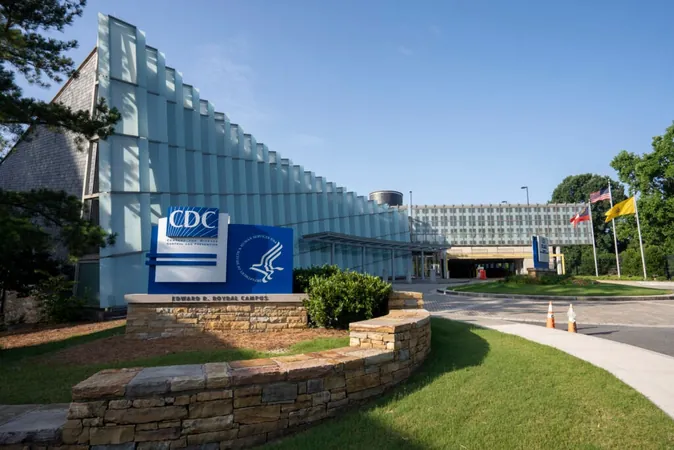
Former CDC Leader Sounds Alarm on U.S. Public Health Crisis: An Inside Look
2025-09-18
Author: Mei
A Shocking Departure from the CDC
Demetre Daskalakis, a seasoned infectious disease expert and Harvard Chan alum, shocked the public health community when he resigned from his leadership role at the Centers for Disease Control and Prevention (CDC) this past August. With an extensive background that includes heading the CDC’s National Center for Immunization and Respiratory Diseases, he now raises urgent concerns about the alarming trajectory of public health in the U.S. and globally.
The Motivation Behind a Career in Public Health
Daskalakis's journey into public health began in the early '90s while volunteering for HIV awareness initiatives in New York City—a cause personal to him due to friends he lost to the disease. His commitment deepened during his tenure with the New York City Department of Health and Mental Hygiene, culminating in critical roles overseeing emergency responses to infectious disease outbreaks, including measles and COVID-19.
Hope Turns to Despair: A Shift in Leadership
Initially optimistic about the new administration's commitment to public health, Daskalakis was soon disillusioned. He had collaborated with Operation Warp Speed and believed in initiatives like Ending the HIV Epidemic. However, he became increasingly concerned with the lack of transparency and alleged manipulation of scientific data within the agency.
Controversial Changes to Immunization Policies
One major policy decision that prompted his resignation involves the controversial adjustment of the immunization schedule which now no longer recommends COVID-19 vaccines for healthy children and pregnant women. Daskalakis argues that this decision misrepresents scientific reality and jeopardizes public health, particularly since COVID poses unique risks during pregnancy.
A Disconcerting Announcement on Social Media
Daskalakis found out about significant changes to vaccine schedules via a tweet, not through official channels within CDC. This lack of communication and the way key decisions were made without input from experts left him alarmed and questioning the agency's integrity.
Deepening Mistrust and Vaccine Hesitancy
The former CDC official worries that undermining vaccination policies will cultivate distrust, complicating future public health responses during emergencies. With decades-long efforts to build public confidence in vaccines at risk, he forewarns of the potential consequences should a new pandemic arise.
Budget Cuts and Staffing Shortages: A Public Health Nightmare
Daskalakis is also troubled by recent personnel cuts at the CDC, which could cripple the agency’s ability to respond to future health crises. The loss of expertise across various disciplines means that the CDC could find itself ill-equipped to handle emerging infectious threats.
The Global Health Implications
As the U.S. withdraws from participation in organizations like the World Health Organization, Daskalakis foresees a future where international collaboration on public health becomes increasingly strained. Data sharing has dramatically dropped, leaving the CDC 'flying blind'—a situation that could have devastating global repercussions.
The Dark Future of Vaccine-Preventable Diseases
With rising concerns about diseases like measles and polio, Daskalakis fears we may regress in our public health achievements as vaccination campaigns falter. The potential loss of immunity could usher in a new era of outbreaks that the U.S. is not prepared for.
A Call to Action: The State of Public Health is at Risk
In the aftermath of his resignation, Daskalakis remains outspoken. He urges the public and health professionals alike to recognize the severity of the situation, emphasizing that America’s health—along with that of the entire globe—is in jeopardy.


 Brasil (PT)
Brasil (PT)
 Canada (EN)
Canada (EN)
 Chile (ES)
Chile (ES)
 Česko (CS)
Česko (CS)
 대한민국 (KO)
대한민국 (KO)
 España (ES)
España (ES)
 France (FR)
France (FR)
 Hong Kong (EN)
Hong Kong (EN)
 Italia (IT)
Italia (IT)
 日本 (JA)
日本 (JA)
 Magyarország (HU)
Magyarország (HU)
 Norge (NO)
Norge (NO)
 Polska (PL)
Polska (PL)
 Schweiz (DE)
Schweiz (DE)
 Singapore (EN)
Singapore (EN)
 Sverige (SV)
Sverige (SV)
 Suomi (FI)
Suomi (FI)
 Türkiye (TR)
Türkiye (TR)
 الإمارات العربية المتحدة (AR)
الإمارات العربية المتحدة (AR)